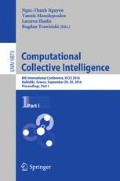Abstract
In this paper, we propose an approach to the subjectivity detection on Twitter micro texts that explores the uses of the structured information of the social network framework. The sentiment analysis on Twitter has been usually performed through the automatic processing of the texts. However, the established limit of 140 characters and the particular characteristics of the texts reduce drastically the accuracy of Natural Language Processing (NLP) techniques. Under these circumstances, it becomes necessary to study new data sources that allow us to extract new useful knowledge to represent and classify the texts. The structured information, also called meta-information or meta-data, provide us with alternative features of the texts that can improve the classification tasks. In this study we have analysed the use of features extracted from the structured information in the subjectivity detection task, as a first step of the polarity detection task, and their integration with classical features.
Access this chapter
Tax calculation will be finalised at checkout
Purchases are for personal use only
Notes
- 1.
- 2.
Workshop on Sentiment Analysis at SEPLN Conference.
References
Alonso, M.A., Vilares, D.: A review on political analysis and social media. Procesamiento del Lenguaje Nat. 56, 13–24 (2016)
Barbosa, L., Feng, J.: Robust sentiment detection on twitter from biased and noisy data. In: Proceedings of the 23rd International Conference on Computational Linguistics: Posters, pp. 36–44 (2010)
Belkaroui, R., Faiz, R.: Towards events tweet contextualization using social influence model and users conversations. In: Proceedings of the 5th International Conference on Web Intelligence, Mining and Semantics, p. 3. ACM (2015)
Bermingham, A., Smeaton, A.F.: On using Twitter to monitor political sentiment and predict election results (2011)
Cotelo, J.M., Cruz, F., Ortega, F.J., Troyano, J.A.: Explorando Twitter mediante la integracin de informacin estructurada y no estructurada. Procesamiento del Lenguaje Nat. 55, 75–82 (2015)
Davidov, D., Tsur, O., Rappoport, A.: Enhanced sentiment learning using Twitter hashtags and smileys. In: Proceedings of the 23rd International Conference on Computational Linguistics: Posters (2010)
De Choudhury, M., Gamon, M., Counts, S., Horvitz, E.: Predicting depression via social media. In: ICWSM, p. 2 (2013)
Esparza, S.G., OMahony, M.P., Smyth, B.: Mining the real-time web: a novel approach to product recommendation. Knowl. Based Syst. 29, 3–11 (2012)
Friedman, J.H.: Greedy function approximation: a gradient boosting machine. Ann. Stat. 29, 1189–1232 (2001)
Han, B., Cook, P., Baldwin, T.: unimelb: Spanish text normalisation. In: Tweet-Norm@ SEPLN, pp. 32–36 (2013)
Harris, Z.S.: Distributional structure. Word 10(2–3), 146–162 (1954)
Jeni, L.A., Cohn, J.F., De La Torre, F.: Facing imbalanced data-recommendations for the use of performance metrics. In: 2013 Humaine Association Conference on Affective Computing and Intelligent Interaction (ACII), pp. 245–251. IEEE (2013)
Jiang, L., Yu, M., Zhou, M., Liu, X., Zhao, T.: Target-dependent Twitter sentiment classification. In: Proceedings of the 49th Annual Meeting of the Association for Computational Linguistics: Human Language Technologies, vol. 1, pp. 151–160 (2011)
Liu, B.: Sentiment analysis and opinion mining. Synth. Lect. Hum. Lang. Technol. 5(1), 1–167 (2012)
Liu, B., Zhang, L.: A survey of opinion mining and sentiment analysis. In: Aggarwal, C.C., Zhai, C.X. (eds.) Mining Text Data, pp. 415–463. Springer, New York (2012)
Martínez-Cámara, E., Martín-Valdivia, M.T., Ureña-López, L.A., Montejo-Ráez, A.R.: Sentiment analysis in Twitter. Nat. Lang. Eng. 20(01), 1–28 (2014)
Medhat, W., Hassan, A., Korashy, H.: Sentiment analysis algorithms and applications: a survey. Ain Shams Eng. J. 5(4), 1093–1113 (2014)
Mejova, Y., Srinivasan, P., Boynton, B.: GOP primary season on Twitter: popular political sentiment in social media. In: Proceedings of the Sixth ACM International Conference on Web Search and Data Mining. ACM (2013)
Mislove, A., Lehmann, S., Ahn, Y.Y., Onnela, J.P., Rosenquist, J.N.: Understanding the demographics of Twitter users. ICWSM 11, 5 (2011)
Monti, C., Rozza, A., Zapella, G., Zignani, M., Arvidsson, A., Colleoni, E.: Modelling political disaffection from Twitter data. In: Proceedings of the Second International Workshop on Issues of Sentiment Discovery and Opinion Mining (WISDOM 2013) (2013)
Pang, B., Lee, L.: Opinion mining and sentiment analysis. Found. Trends Inf. Retrieval 2(1–2), 1–135 (2008)
Pennacchiotti, M., Popescu, A.M.: A machine learning approach to Twitter user classification. ICWSM 11(1), 281–288 (2011)
Porta, J., Sancho, J.L.: Word normalization in Twitter using finite-state transducers. In: Tweet-Norm@ SEPLN, vol. 1086, pp. 49–53 (2013)
Smith, C.: DMR Twitter Statistic Report. Last modified 26 Feb 2016. http://expandedramblings.com/index.php/downloads/twitter-statistic-report/. Accessed 28 Mar 2016
Ting, K.M., Witten, I.H.: Issues in stacked generalization. J. Artif. Intell. Res. (JAIR) 10, 271–289 (1999)
Villena-Román, J., García-Morera, J., García-Cumbreras, M.A., Martínez-Cámara, E., Martín-Valdivia, M.T., Ureã-López, L.A.: Overview of TASS 2015. In: Proceedings of TASS 2015: Workshop on Sentiment Analysis at SEPLN, vol. 1397. CEUR-WS.org (2015)
Volkova, S., Wilson, T., Yarowsky, D.: Exploring demographic language variations to improve multilingual sentiment analysis in social media. In: EMNLP, pp. 1815–1827 (2013)
Wolpert, D.H.: Stacked generalization. Neural Netw. 5(2), 241–259 (1992)
Author information
Authors and Affiliations
Corresponding author
Editor information
Editors and Affiliations
Rights and permissions
Copyright information
© 2016 Springer International Publishing Switzerland
About this paper
Cite this paper
Sixto, J., Almeida, A., López-de-Ipiña, D. (2016). An Approach to Subjectivity Detection on Twitter Using the Structured Information. In: Nguyen, NT., Iliadis, L., Manolopoulos, Y., Trawiński, B. (eds) Computational Collective Intelligence. ICCCI 2016. Lecture Notes in Computer Science(), vol 9875. Springer, Cham. https://doi.org/10.1007/978-3-319-45243-2_11
Download citation
DOI: https://doi.org/10.1007/978-3-319-45243-2_11
Published:
Publisher Name: Springer, Cham
Print ISBN: 978-3-319-45242-5
Online ISBN: 978-3-319-45243-2
eBook Packages: Computer ScienceComputer Science (R0)

